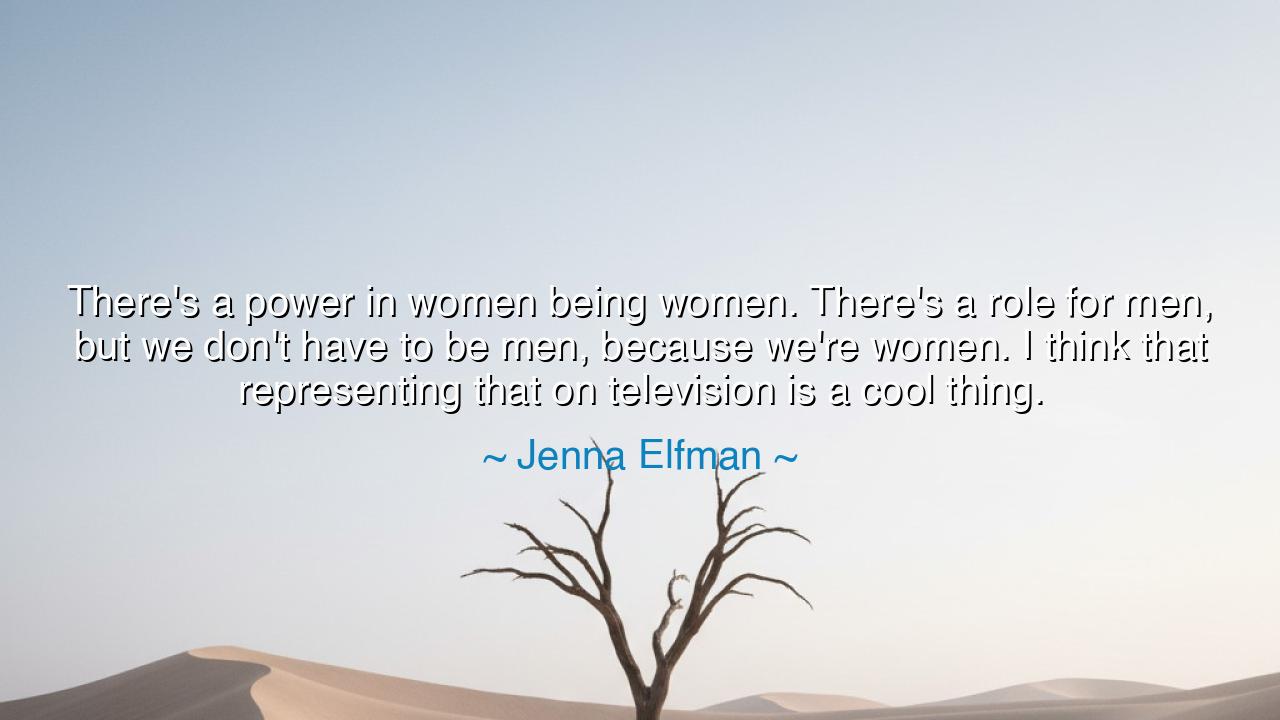
There's a power in women being women. There's a role for men, but
There's a power in women being women. There's a role for men, but we don't have to be men, because we're women. I think that representing that on television is a cool thing.






In the journey of human history, there has been no greater struggle than the quest for identity and equality—the effort to define oneself not by the standards or expectations of others, but by the truth of one’s own being. Jenna Elfman, in her insightful words, “There’s a power in women being women. There’s a role for men, but we don’t have to be men, because we’re women. I think that representing that on television is a cool thing,” speaks to the essence of empowerment and the celebration of individual identity. She affirms that women, in their own right, possess an intrinsic power and role in society, one that need not mirror or replicate that of men. Instead, they must stand in their own truth, embodying the strength and wisdom that comes with being authentically and unapologetically female.
The ancients knew well the power that lies in embracing one’s true self. In ancient Greece, the goddesses of mythology—such as Athena, the goddess of wisdom and strategy, and Artemis, the fierce protector of women and children—embodied the very essence of female empowerment. These deities were not diminished by their roles; they were revered for their unique powers and influence. Just as Athena was known for her wisdom and strategic mind, Artemis for her independence and strength, Elfman’s words echo the sentiment that women do not need to adopt masculine qualities to be powerful or valuable. Instead, they must embrace the qualities that are innately theirs, not as a weakness, but as a source of strength that is uniquely their own.
In Rome, women like Cornelia, the mother of the Gracchi brothers, demonstrated the profound influence that women could have on society. Cornelia, though not an active political figure, shaped the future of Rome through her wisdom and nurturing role. She famously rejected the jewels offered by her contemporaries, instead valuing her sons, who would go on to lead reforms, as her greatest treasure. This story reveals a fundamental truth: the power of women lies not in mimicking the roles of men, but in fulfilling their own unique roles with dignity, intelligence, and strength. Elfman’s statement honors this very idea—that women possess an innate power that should be celebrated on its own terms, without the need to conform to masculine ideals.
In more modern history, the women’s suffrage movement provides another compelling example of the power in women embracing their identity and pushing for their rightful place in the world. Figures like Susan B. Anthony and Elizabeth Cady Stanton did not seek to become men, but rather to assert their right to contribute equally to society, to have their voices heard in the same way that men’s had been. They understood that the power of women was not to be diminished by society’s constraints but to be expressed in a way that was authentic to their experience as women. In the same way, Elfman’s words speak to the strength that comes from authenticity, from women owning their roles and standing tall in their feminine power.
Elfman’s reflection on representation in the media echoes the longstanding battle for visibility and recognition. For centuries, women have been either invisible or forced into narrow, stereotypical roles that do not reflect the full complexity of their identity. Today, with increasing visibility of diverse female characters on television and film, women are beginning to see themselves not as mere reflections of male ideals, but as whole, complex individuals with unique roles to play. Just as Socrates believed that self-knowledge was the path to wisdom, so too must women embrace their own self-worth and the power of their own narratives. Elfman’s statement serves as a reminder that representation matters, and it is not just about placing women into roles traditionally reserved for men, but about honoring their own space in the world.
The lesson from Elfman’s words is one of empowerment and authenticity. Women must not feel the need to assimilate into the roles that men have created, but instead, must be encouraged to flourish in their own ways, embracing the unique qualities that make them women. There is immense power in the ability to stand in one’s truth, to define oneself, and to reject the pressures of societal expectations. The lesson of the ancients, echoed by Elfman, is that strength lies in knowing who we are, not in trying to be something we are not. This principle applies to women as much as it does to men, for only when we allow each person to live authentically, in harmony with their true self, can we truly flourish as a society.
In practical terms, the message is clear: as individuals, as members of society, and as media creators, we must celebrate and empower women to be who they truly are, free from the pressures of conformity. We must create spaces—whether in our homes, schools, workplaces, or on the screen—where women can be fully themselves, valued for the qualities that are uniquely feminine. Let us follow the wisdom of the ancients, and of Elfman, and build a world where the power of women is not just acknowledged but celebrated in its truest, most authentic form. Through this, we ensure a society that respects and honors all, where every individual can flourish, regardless of gender.






AAdministratorAdministrator
Welcome, honored guests. Please leave a comment, we will respond soon